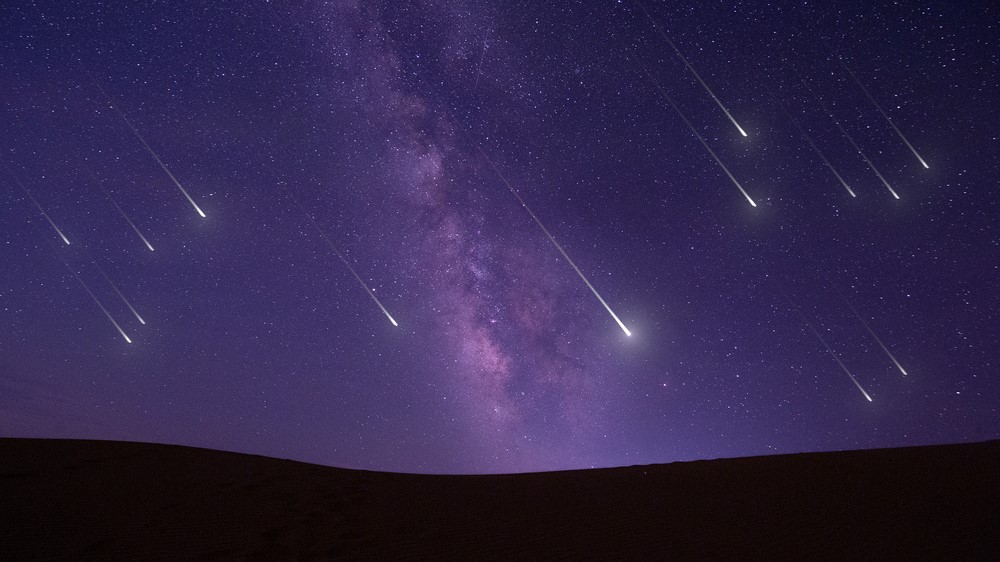Extremely rare fireball meteor may have sparked a blaze that burned down a California home
A man has claimed that the fire that burned down his house in California was started by a fireball meteor, which was spotted by several witnesses in the area. But firefighters are still trying to determine what started the blaze.

A house that recently burned down in California may have been set ablaze by an extremely rare meteorite impact. Several witnesses saw a spectacular fireball meteor streak across the sky just above the property at the same time the home went up in smoke, but nobody saw the falling space rock land.
On Nov. 5, the Penn Valley Fire Department was called to tackle a fire at a house in California's Nevada County near Englebright Lake. The firefighters eventually extinguished the blaze, but not before the house, a nearby travel trailer and a parked pickup truck were destroyed, according to Sacramento-based news site KCRA. The house's owner, local ranger Dustin Procita, and his wife were unharmed in the incident, but the couple's dog died in the fire, according to NBC News.
"I heard a big bang," Procita told KCRA. "I started to smell smoke and I went onto my porch and it was completely engulfed in flames."
Around the same time the house caught fire, a fireball meteor — a very bright meteor with a luminosity equal to or greater than Venus in the night sky — was seen by several witnesses in the area. Dashcam footage, captured and posted on Twitter by KCRA journalist Derek Schnell, showed the bright flash of the meteor burning up in the distance from his viewpoint in El Dorado County. After seeing the footage of the fireball and talking to locals, Procita is convinced the meteor hit his porch and started the fire.
"They said it was a meteor," Procita said. "I did not see what it was, but from everybody I talked to — [it] was a flaming ball falling from the sky, landed in that general area."
Related: Rare daytime fireball meteor creates massive sonic boom over UK
So far, the Penn Valley Fire Department has not ruled out that the blaze was caused by a meteorite.
Get the world’s most fascinating discoveries delivered straight to your inbox.
"I had one individual tell me about it [the meteor] first and like, OK, I'll put that in the back of my mind," Penn Valley Capt. Josh Miller told KCRA. "But then more people — two, three or four more — started coming in and talking about it."
However, experts from the California Department of Forestry and Fire Protection, or Cal Fire, who helped tackle the blaze and are investigating its origins, remain cautious.
"That [meteor impact] is a potential cause, but it's too early to pinpoint one," Cal Fire Capt. Clayton Thomas told NBC News. "I can say that during the incident, many people approached the fire department to say they saw a potential meteor fall in that area," he added. "What we haven't seen yet is any video or witness say that it struck an actual structure."
Several news outlets have reported that the fireball was part of the Taurid meteor shower, an annual event caused by debris from Comet Encke. The Taurid meteor shower produces exceptionally bright fireballs, often nicknamed "Halloween fireballs," that can be seen across the globe. This year, the meteor shower first peaked between Nov. 4 and Nov. 5, according to Live Science's sister site Space.com, which means it coincided with the fireball seen over California.
However, despite their unusual brightness, the Taurid fireballs are unlikely to reach the ground. AlthoughTaurid meteors can hit Earth's surface, so far, no evidence of this has ever been found, according to NASA.
It is also unclear if any potential meteorite would have been hot enough to ignite a house fire.
Although fireballs burn "red hot" in the sky, they are much colder by the time they hit the ground, according to the American Meteor Society (AMS). "During the final free-fall portion of their flight, meteorites undergo very little frictional heating, and probably reach the ground at only slightly above ambient temperature," AMS representatives wrote.
Moreover, the chances of someone's house being hit by a meteor are astronomically small. In total, scientists estimate that fewer than 10,000 meteorites hit Earth's surface every year, and most of them end up in the ocean and other uninhabited areas or are too small to be found.
However, it is not unheard of for meteorites to hit people's property. In February 2021, a tiny meteorite weighing around 11 ounces (300 grams) was found on the driveway of a house in Gloucestershire in England. On this occasion, the residents had no idea that the meteorite had hit their property and discovered it only after noticing a black smudge on the driveway.
Time will tell if firefighters can recover any evidence of a meteorite in the wreckage of the house fire. But for now, Procita remains convinced that his home was destroyed by a falling space rock, and despite his current circumstances, he still considers the unlikely event to be a lucky omen. "I guess I might be buying a lottery ticket today," he told KCRA.

Harry is a U.K.-based senior staff writer at Live Science. He studied marine biology at the University of Exeter before training to become a journalist. He covers a wide range of topics including space exploration, planetary science, space weather, climate change, animal behavior and paleontology. His recent work on the solar maximum won "best space submission" at the 2024 Aerospace Media Awards and was shortlisted in the "top scoop" category at the NCTJ Awards for Excellence in 2023. He also writes Live Science's weekly Earth from space series.




